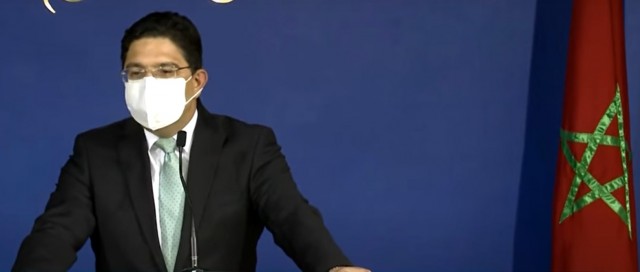Rabat – Morocco has no agenda in Libya other than a wish for Libya to regain its unity and stability, said the Moroccan Minister of Foreign Affairs, Nasser Bourita.
“Morocco will always have open arms for Libyans, without any agenda. Our only aim is the unity and stability of Libya and a solution to the ongoing crisis,” Bourita said.
The Moroccan foreign minister made the statement on Monday, July 27, during a joint press conference. The conference included Aguila Saleh Issa, the president of the Libyan House of Representatives, who is heading a delegation on an official visit to Morocco.
The visit aims to discuss the situation in Libya with Moroccan officials, to find solutions for the crisis.
“Morocco’s unwavering stance makes the country a destination for Libyan brothers to dialogue. Morocco is their second country,” Bourita said.
Commenting on the Libyan delegation’s visit, Bourita expressed his wishes that the discussions can bring Libyans closer to a solution.
“We hope that the coming days will bring positive results that will push towards a political solution. We also hope Libyans find a compromise that would allow them to resume their normal lives and protect their natural resources and wealth,” Bourita said.
Meanwhile, Saleh Issa expressed his thanks to Morocco for its efforts to solve the crisis in Libya.
“Moroccans are more engaged than Libyans themselves in looking for a peaceful solution,” the Libyan official said.
Saleh Issa reiterated the centrality of the Skhirat Agreement, signed in Morocco in 2015. The agreement puts in place an interim Libyan government and a ceasefire between the conflicting parties.
According to the Libyan official, all the initiatives to solve the crisis do not contradict the Skhirat Agreement but build on it.
Converging stances
Saleh Issa said the reason the Libyan crisis has not yet reached a solution is that parties did not fully implement the Skhirat Agreement. He also stressed that the solution to the conflict can only be political, saying that violence makes the situation worse.
Finally, Saleh Issa condemned the Turkish intervention in Libya. According to him, foreign intervention in the country diminishes the chances of reaching a political solution.
The Libyan official’s statements are in line with Morocco’s stance since the start of the conflict. Morocco has always denounced foreign intervention in Libya, stressing that a solution must come from Libyans themselves.
On July 8, Bourita reiterated Morocco’s stance during a virtual meeting of the UN Security Council.
“Morocco expresses its concern, disappointment, and call for mobilization regarding the continued deterioration of the situation in Libya,” Bourita said.
Foreign intervention “is not helping in any way the Libyan parties to rise above narrow interests and to face the challenge of forging together a better future for Libya,” Bourita emphasized.
